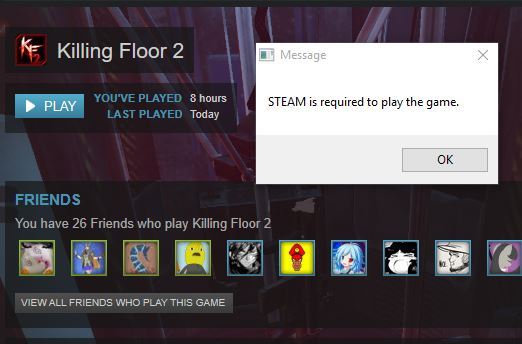[name redacted] - 30 - useless liberal arts degree holder
Don't wanna be here? Send us removal request.
Text
The Forever War: Thoughts on The Last of Us Part II
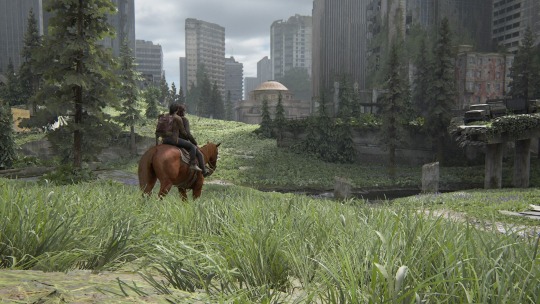
“There were people – a minority of them – that were just stuck on how violent it is and how dark and quite cynical it is about mankind.” --Neil Druckmann, director The Last of Us Part II
“Yeah, once we’re done with this whole thing, I’m gonna teach you how to play guitar.” --Joel, The Last of Us
*This is the spoiler warning for both The Last of Us and Part II*
The Last of Us Part II had lofty ambitions. Meant to invoke The Godfather Part II in theme, epic scope, and even naming convention, the game knows what it has to live up to. I’ve heard many people say The Last of Us is either their favorite game or a contender for the game they’ve ever played. How do you follow up something like that?
The world of TLOU is unforgiving and, I’d argue, misunderstood. Some critics have drawn attention to the TLOU’s relentlessly pessimistic tone and whether or not it’s appropriate. Maddy Myers, writing for Polygon, says that The Last of Us Part II is “...needlessly bleak, at a time when a nihilistic worldview has perhaps never been less attractive”. An entirely fair criticism and worth interrogating, but I think that line of inquiry misses the crisis at the center of TLOU that Part II brilliantly brings into focus.
Like the first game, The Last of Us Part II is a post-9/11 fever dream. No one can ever be trusted, no good deed goes unpunished, and at some point even your friends may have to kill you. The first game gave us brutal depictions of terrorist attacks and authoritarian government crackdowns as a routine part of life in a quarantine zone with dwindling resources. Society was rapidly breaking down, a deep anxiety, rooted in racism and xenophobia, that has preoccupied the minds of Americans and Europeans since 9/11. These depictions of terrorism were not the bulk of the game, but always came at narrative inflection points. The first being the impetus for Joel and Ellie’s trip across America and the last as the game’s oft-maligned conclusion at the Firefly hospital. The infected serves its role as the depersonalized invading hordes; the incomprehensible being from another world, baying at the gates of civilization, ready to bring the whole thing down.
The sequel, wise to not simply retread old ground, instead depicts another aspect of post 9/11 life: a clash of civilizations. The Washington Liberation Front, or Wolves, is a paramilitary organization that were once “freedom fighters,” but now gleefully condone torture and, by the game’s end, attempt to perform a genocide. The Seraphites, by contrast, are a primitivist religious order that eschews the modern, sin filled world and practices self-mutilation and ritual sacrifice. The WLF refer to them as the dehumanizing epithet “scars”. You don’t have to squint very hard to recognize unflattering portrayals of The United States, Great Britain, France, and other so-called Western nations on one side and Iraq, Palestine, Syria, and other “Muslim” countries on the other. Throughout the game the player collects training manuals that accentuate this ideology. Survivalist and prepping manuals. Guerilla warfare tactics. Counterintelligence guidebooks. All totems of the Forever War anxiety that we’ve been marinating in since 2001.
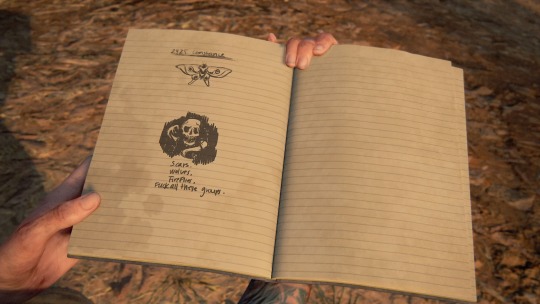
There is no better world to imagine, just a vanishing small series of less bad options. No ideology has any meaning or pulls people towards any greater purpose. Near the end of Part II’s grueling 25 hour playthrough time, Ellie writes in her journal “Scars. Wolves. Fireflies. Fuck all these groups”. And why wouldn’t she believe that? Who hasn’t tried to kill her? Exploring the world, you come across notes and documents that speak of a truce between the two groups that was soon broken. The player never can discern who broke the truce since both sides claim the other was at fault.
Another Forever War is at the heart of Part II’s plot. Ellie and Abby, two young women from vastly different backgrounds, locked into an endless cycle of vengeance and misery that continually escalates, threatening to destroy both of them. Abby is the daughter of the surgeon murdered by Joel at the end of The Last of Us and comes to Ellie’s home in Jackson to violently and sadistically seek revenge. Roughly half the game is spent playing as Ellie and the other half as Abby, we see each of these women survive, love, and lose people close to them. Ellie comes to Seattle with her girlfriend Dina to re-escalate the Forever War. Abby spares Ellie twice, and each time Ellie comes back to kill her. Both women cannot find peace. Abby has reoccurring nightmares where she steps into the room where her father was murdered, discovering his body or someone else she loves. Ellie has PTSD from being forced to witness Joel’s gruesome death; she can’t stop seeing Joel’s broken face on the floor.
Their stories converge a final time. Ellie can’t let it go, she abandons Dina and the life they dreamed of together at the farmhouse for one more shot at Abby. In the interim, Abby and her companion Lev are captured by the Rattlers, a deranged group of slavers. Ellie discovers them on the beach, strung up on wooden posts, left for dead. She cuts them down and provokes Abby into a fight to the death. Despite eventually getting the upper hand and moments away from drowning Abby, Ellie can’t kill her. She lets them escape.
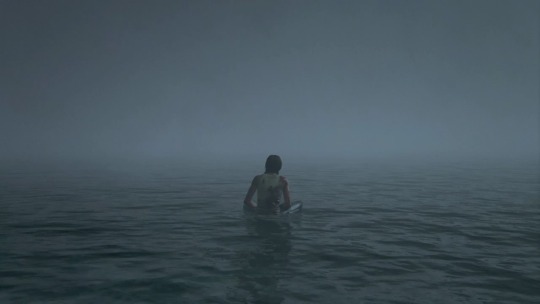
Ellie returns to the farm. It’s abandoned. She picks up Joel’s guitar and attempts to play it. In the fight with Abby, she lost two of her fingers. She can’t play the song Joel taught her, she’ll never play the guitar again. Dina is gone. All of this has been pointless.
It’s the sort of pointlessness that defines the age of the Forever Wars and post 9/11 world. Concepts such as heroism, valor, and justice are dead and replaced with necessary evils, the best of bad options, and endless suspicion. There is no winning, only temporary alliances and truces that will never hold. As always with post 9/11 media, torture is a practical tool to achieve goals, and not a war crime.
As I watched the credits roll on this 25 symphony of misery, I reflected on the final moments of the game and what they say. Had Ellie simply stayed with Dina and not took off in pursuit of Abby one final time, Abby would have died on the beach where Ellie found her. Ellie would have no way of knowing this, but all she had to do was just let it go.
1 note
·
View note
Text
The Rebuild of Final Fantasy VII: Your Expectations Will (Not) Be Met
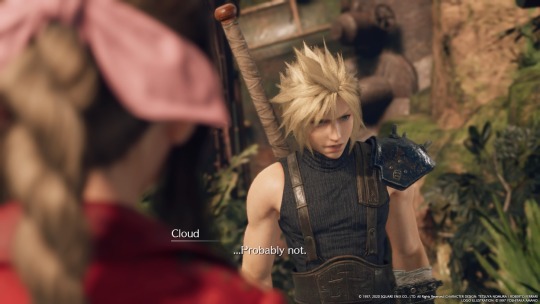
I apologize for the stupid title and I promise I’m going to talk about the Final Fantasy VII Remake, but I have to get this out of the way first. Sometime in the mid 2000s, acclaimed artist and director Hideaki Anno announced that he was going to remake his beloved anime series Neon Genesis Evangelion the way it should have been the first time, free from technical and budgetary restraints. Evangelion had a notoriously strange ending when the original anime aired, consisting of character talking over still images, abstract art, and simple animations. It was highly polarizing and controversial. Anno, for his part, received death threats and the headquarters of the studio that produced the anime was vandalized. Soon after the initial uproar Anno would direct The End of Evangelion, a retelling of the final two episodes of the anime, and that seemed to mostly satisfy the fanbase. Looking back now, The End of Evangelion wasn’t “fixing” something that was “broken,” no, it was a premonition: a vision of things to come. Why remake the ending when you can just remake the whole damn thing?
The mid 2000s also saw the birth of the Compilation of Final Fantasy VII: a sub-series of projects expanding the universe and world of the video game that had “quite possibly the greatest game ever made” proudly printed on the back of its CD case. The Compilation consisted of three games, all on different platforms, and a film. First was Advent Children, a sequel to Final Fantasy VII, where three dudes that look like discarded Sephiroth concept art all have anime fights with our beloved protagonists, culminating in a ridiculous gravity defying sword fight between Cloud and Sephiroth. Before Crisis and Crisis Core are prequels that expand the story of the Turks and Zack Fair, respectively. Then there’s Dirge of Cerberus, an action shooter staring secret party member and former Turk Vincent. Were these projects good? I’d say they were largely forgettable. Crisis Core stood out as the obvious best of the bunch and I think may be worth revisiting.
As a business model, the practice pioneered by the Compilation would continue on and eventually brings us FFXIII (and sequels), FF Versus XIII (which would later become FFXV), and FF Agito XIII (which would later become FF Type-0). If that’s all incredibly confusing to you, I’m sorry, I promise I will begin talking about the Final Fantasy VII Remake soon. Suffice it to say, both Final Fantasy VII and Neon Genesis Evangelion have a certain gravity. They punch above their weight. They are both regarded as absolute classics, flaws and all. And yet, in both cases, the people responsible for their creation decided that their first at bat wasn’t good enough and it was time to recreate them as they were meant to be all along. I think this way of thinking about art is flawed, limitations are as much a part of the creative process as vision and intent. Yet, we find ourselves in a world with a remake of Final Fantasy VII, so I guess we should talk about it.
From this point forward, there’s going to be major spoilers for every Final Fantasy VII related media. So, be warned.
So, is the Final Fantasy VII Remake any good? To me, that’s the least interesting question, but we can get into it. FFVIIR is audacious, that’s for sure. Where Anno condenses and remixes a 26 episode anime series into four feature length films, the FFVIIR team expands an around 5 hour prologue chapter into a 30+ hour entire game. Naturally, there will be some growing pains. The worst example of this is the sewers. The game forces you to slog through an awful sewer level twice, fighting the same boss each time. This expanded sewer level is based on a part of the original game that was only two screens and was never revisited.
Besides the walk from point A to point B, watch a cutscene, fight a boss, repeat that you’d expect from a JRPG, there’s also three chapters where the player can explore and do sidequests. The sidequests are mostly filler, but a select few do accomplish the goal of fleshing out some of the minor characters. You spend way more time with the Avalanche crew, for example. Out of them, only Jesse has something approaching a complete personality or character arc that matters. The main playable cast is practically unchanged which was a bit surprising to me. I figured Square-Enix would tone down Barret’s characterization as Mr. T with a gun for an arm, but they decided, maybe correctly, that Barret is an immutable part of the Final Fantasy VII experience. Also, it’s practically unforgivable that Red XIII was not playable in the remake considering how much time you spend with him. I don’t understand that decision in the slightest.
The game’s general systems and mechanics, materia, combat, weapon upgrades, etc. are all engaging and fun and not much else really needs to be said about it. I found it to be great blend of action/strategy. Materia really was the peak of JPRG creativity in the original FFVII and its recreation here is just as good. The novelty of seeing weird monsters like the Hell House and the “Swordipede” (called the Corvette in the original) make appearances as full on boss fights with mechanics is just weaponized nostalgia. In general, the remake has far more hits than misses, but those misses, like the sewers and some of the tedious sidequests, are big misses. It is a flawed game, but a good one. If I were to pick a favorite part of the game, I’d have to pick updated Train Graveyard section which takes lore from the original game and creates a mini-storyline out of it.
If that was all, however, then honestly writing about Final Fantasy VII Remake wouldn’t be worth my time or yours. The game’s ambition goes way further than just reimagining Midgar as a living, real city. There’s a joke in the JRPG community about the genre that goes something like this: at the start of the game, you kill rats in the sewer and by the end you’re killing God. Well, when all is said and done, the Final Fantasy VII Remake essentially does just that. Narratively, the entire final act of the game is a gigantic mess, but if you know anything about me then you know I’d much rather a work of fiction blast off into orbit and get a little wild than be safe and boring.
In the original games, the Lifestream is a physical substance that contains spirits and memories of every living being. Hence, when a person dies, they “return to the planet”. It flows beneath the surface of the planet like blood flows in a living person’s veins and can gather to heal “wounds” in the planet. In the original game, the antagonist, Sephiroth, seeks to deeply wound the planet with Meteor and then collect all the “spirit energy” the planet musters to heal the wound. The remake builds on this concept by introducing shadowy, hooded beings called Whispers. The Whispers are a physical manifestation of the concept of destiny and they can be found when someone seeks to change their fate, correcting course to the pre-destined outcome. Whispers appear at multiple points throughout the game’s storyline both impeding and aiding the party. The ending focuses heavily on them and the idea that fate and destiny can be changed. We receive visions throughout the game which some will recognize as major story beats and images from the original game. After dealing with Shinra and rescuing Aerith, the game immediately switches over to this battle against destiny and fate that you’re either going to love or hate. The transition is abrupt and jarring. While Cloud has shown flashes of supernatural physical abilities throughout the game, suddenly he has gone full Advent Children mode and is flying around cleaving 15 ton sections of steel in half with his sword. The party previously took on giant mutated monsters, elite soldiers, and horrific science experiments, but now the gloves are off and they’re squaring up against an impossibly huge manifestation of the Planet’s will. Keep in mind, in the narrative of the original FFVII, the Midgar section was rougly 10%, if that, of the game’s full storyline. This is, frankly, insane, but I’d be lying if I didn’t love it.
The Final Fantasy VII Remake, with its goofy JRPG concluding chapter, is forcing the player to participate in the original game’s un-making. We see premonitions of an orb of materia falling to the ground, we see an older Red XIII gallop across the plains, we see a SOLDIER with black hair and Cloud’s Buster Sword make his final stand, we see Cloud waist deep in water holding something or someone. We all know what these images represent, they’ve been part of imaginations for decades. But the Final Fantasy VII Remake allows us (or forces us, depending on perspective, I guess) to kill fate, kill God, and set aside all we thought we knew about how the game would play out post-Midgar. The most obvious effect of our actions is the reveal that Zack survived his final stand against Shinra and instead of leaving Cloud his sword and legacy, helped him get to Midgar safely. I have my doubts and my worries about the future of this series. I’m not sure when the next part of the game will be released or what form it will come in, but I can’t believe I’m as excited as I am to see it.
Of course, part of me wishes they’d just left well enough alone. Remakes are generally complete wastes of time and effort. Not all, but most. Maybe I’m, to borrow a term from pro wrestling lingo, a complete mark here and I just love JRPGs and Final Fantasy VII so much that I’ll countenance close to anything bearing its name. I’ve tried my best to be as critical and fair as possible to the game and I hope that if you’re on the fence and reading this I’ve maybe helped you decide if it’s for you or not. I think the Final Fantasy VII Remake is worth your time if you’re looking for a good, meaty JRPG. It’s not perfect and it’s final act is insane, but that just makes me love it more.
Have you ever wondered what it would be like for Zack, Cloud, and Aerith to face Sephiroth in the Planet’s core? I know 15 year old me did. And he may get his wish.
6 notes
·
View notes
Text
No one’s ever really gone and nothing matters, thoughts on Star Wars IX

Near the end of “The Last Jedi”, Luke Skywalker says to his sister Leia, “no one’s ever really gone” as he walks out into the salty battlefield to face his former student. The line is stuffed with kaleidoscopic meaning, some literal, some ironic, but above all, it is writer/director and merry prankster Rian Johnson laughing in the audience’s face.
It’s impossible to talk about Star Wars: The Rise of Skywalker without talking about Star Wars: The Last Jedi because as The Last Jedi was a direct reaction to Star Wars: The Force Awakens, The Rise of Skywalker is a reaction to The Last Jedi. Yes, I know that’s a terribly worded sentence, but none of the marketing materials for any of the Disney films bothers to include an episode number. Similarly, the the first thing you’ll likely notice about Star Wars (IX): The Rise of Skywalker is that the film preceding it meant absolutely nothing. There is no “sequel trilogy”, only three films bearing the Star Wars brand with zero thematic or narrative consistency. These films must, however, make a “trilogy” because that’s how Star Wars films are made. There must be three of them. One of Disney’s chief innovations in the Star Wars canon was making a trilogy of films that made no sense together.
There’s a treasure trove of hamfisted, weird, and downright strange scenes in TROS. Leia’s scenes are dreadful, “they fly now” is still bad, only one of the characters, Kylo Ren, has any sort of real development, and so much more. Furthermore, since Rian Johnson decided to take a wrecking ball to the entire franchise as an intellectual exercise, the first 20 minutes of TROS is a breakneck paced exposition montage that establishes the primary villain and conflict. It’s a baffling way to start the final episode of a trilogy. Writer/director JJ Abrams simply pretends the preceding film did not exist and starts over. In fact, there’s multiple points where JJ Abrams drops trow and takes a giant dump on TLJ. My favorite simply for how incredibly petty it is is when Rey tosses her lightsaber into a burning wreck and Luke Skywalker’s Force Ghost snags it mid flight and says “A Jedi’s weapon should be treated with respect”.
This isn’t all on Rian, however. Contrary to popular belief, Rian Johnson didn’t just barge into Disney HQ, take Mickey hostage, and demand that he get to ruin Star Wars as so many people on Twitter have claimed. Kathleen Kennedy and everyone ultimately had to sign off on his script and vision. And there very well could be a universe where Johnson’s Star Wars IX: Fuck You, Nerds is released to massive success and critical acclaim. There’s certainly a whole internet full of people who not only love TLJ, but say “it’s the best Star Wars movie”. God bless, I’m glad you enjoyed it, we just don’t agree. And it’s not because of Rose (who is actually great) or Canto Bight or the Purple Haired Lady, or any of that nonsense. It’s because for all its pretensions at “subversion”, TLJ ultimately fails at subverting anything. The Jedi are good, the Sith are still bad, and the Rebellion is saved.
I realize I’m four paragraphs in and hardly talked about the actual film. Well, despite the fact that it’s a technical and narrative apocalypse that lacks any consistent theme or meaning, it’s a pretty fun movie. It’s watchable. Unlike the previous film, it has heroes going on an adventure through space. The long promised Knights of Ren show up to sulk around and kidnap Chewbacca. Ian McDiarmid is an absolute treasure as Emperor Palpatine and if you don’t miss him then you’re a liar. The film remixes a bunch of old Star Wars scenes like the one where our heroes run through an enemy star craft shooting Stormtroopers to save their friend and even steals a bunch of plotlines and concepts from the Knights of the Old Republic video games. A lightsaber collides with another lightsaber at multiple points in the film. There are far worse ways to spend two hours and 20 minutes. I had a good time with it.
And lots of people seem to enjoy it, too. Most of my friends “loved” it. The Rotten Tomatoes audience scores are much higher than the critic scores. This is, apparently, the Star Wars people want. While it fails spectacularly as a satisfying singular film and the entire Disney Star Wars exercise fails as a trilogy, I suppose this is the ending the “Skywalker Saga” deserves: a loud, bombastic, backbiting, petty, shitty, stupid end.
1 note
·
View note
Link
71K notes
·
View notes
Text
The Jordan Peterson Post
It’s easy to imagine a worse version of myself sitting in front of the computer screen right now. Resentful, angry, listless and lashing out at a world that doesn’t seem to have a place for me.
I did everything I was supposed to, yet I’m up to my eyeballs in debt. I have a decent, but, in the grand scheme of things, completely pointless job. None of my romantic pursuits have, to use an extremely tired metaphor, bore fruit. I’m about to turn 30 with less to show for it than my parents at the same point in their lives.
This is not to say that I don’t feel resentful, angry, and listless. I do. I just don’t resent and hate the people who have told me no in both professional life and love because I understand that they are adults with feelings, desires, preferences. etc.
As much as it pains me to admit it, I’m exactly the kind of person that, in another life, would have fallen under the spell of Jordan B. Peterson, the 55 year old Canadian psychologist, public intellectual, and author of 12 Rules For Life: An Antidote to Chaos.
Years before Peterson burst onto the scene vying to become every frustrated young man’s Online Dad, he was just an academic obsessed with Jungian archetypes, meaning, mythology, religion, and so on. I would imagine that the type of person that picks up a copy of Peterson’s latest self help book would be profoundly confused if curiosity got the better of them and they flipped through his previous book Maps of Meaning: The Architecture of Belief.
Peterson, after all, is a credentialed academic and college professor which paradoxically seems to make him more authentic to the vast swaths of young men who have long held that academics, usually also feminists, have their heads up their asses and spend too much time fretting about things that do not matter at all.
Yet Peterson has touched a nerve. In the world of #metoo and studies showing women outnumber men in college admissions, many young men feel aggrieved by the changing social paradigm.
My feelings on Peterson were crystallized years ago when his began his meteoric ascendancy by misrepresenting and lying about both the content and the practical effects of Canadian Bill C-16 which gave gender expression and identity protected status under the Canadian Human Rights Act. Peterson incorrectly claimed that the law would compel him to use what he considers are made-up, ridiculous pronouns for students like “they” or “ze” or be reprimanded.
He frequently makes statements like this one he gave to the BBC back in 2016: “I've studied authoritarianism for a very long time - for 40 years - and they're started by people's attempts to control the ideological and linguistic territory.”
It’s been two years since he said that they were coming for his job and his freedom and yet and Canada has shown no signs of slipping into totalitarianism and Jordan Peterson remains employed at the University of Toronto. Best laid plans, I guess.
Since then, however, his Patreon has exploded with contributions. Before he hid the amount of money he was making, it was upwards of $50,000 a month. That seems like an awful lot of cash for telling young men to stand up straight and clean their rooms. My mom does that for free everyday.
Of course, that’s not the point. Jordan Peterson’s 12 Rules For Life contains mostly ordinary and completely benign advice that may very well help someone get their lives together. But that’s not why Jordan Peterson continues to show up in our newsfeeds and comment sections.
Jordan Peterson continues to exist because of the aggrieved, resentful, angry young men that have made the internet such a dark place to visit. Some of you will remember the #GamerGate controversy. If not, the short version is that false accusations that Zoe Quinn, an indie game developer, slept with a game critic for a good review of her hitherto unheard of indie game and a feminist critique of popular games by a YouTube channel operated by Anita Sarkeesian led to sustained, coordinated harassment campaign against them. The movement resulted in several bomb threats, death threats etc. aimed at Quinn, Sarkessian, and many other male, female and minority voices in the gaming community. Despite this, the movement insisted that it was simply advocating for “ethics in game journalism” and was not a harassment campaign. It’s not that they didn’t have real grievances, games journalism has plenty of issues, but they gave away the game by refusing to formulate their own critique of the problems with the gaming press or to construct a cohesive set of principles or any discernible ideology. Instead, they simply extracted pleasure from causing pain to women who had the audacity to speak their minds online.
The Venn Diagram of people who posted 30 tweets a day about #GamerGate four years ago and people who won’t shut up about Jordan Peterson and free speech today is a single overlapping circle.
And there but the grace of God go I.
In Peterson’s famous VICE interview, he, like the #GamerGaters before him, gave away the game. The conversation turns to interactions between men and women in both life and the workplace. The interviewer asks him if men and women can work together without sexual harassment. Peterson then explains:
“We don’t know what the rules are. Here’s a rule how about no makeup in the workplace. Why should you wear makeup in the workplace. Isn’t that sexually provocative? It’s not? What is it then? What’s the purpose of makeup? Why do you make your lips red? Because they turn red during sexual arousal, that’s why.”
If you think about this for more than one second, it’s the same old tired conservative/reactionary line about women who get harassed deserved it for dressing provocatively and share the blame. Have we not moved past this?
As women and people of color continue to gain more and more power in our society, the undue advantages given to people like me will shrink. Unfortunately, this is interpreted by many young men as an attack and not as society becoming more equitable. We’ve seen this happen over and over again online. Jordan Peterson is the just the latest and thus far greatest figure to emerge and rush to the aid of the young man who finds himself beset on all sides by enemies.
1 note
·
View note
Text
wow cool facts about anime
have you ever wondered why anime people have such big eyes like this:

that’s because of scrooge mcduck
Osamu Tekuza. creator of Astro Boy and often called “The Godfather of Anime,” was a big fan of the Scrooge McDuck comics from back in the fifties and when he created Astro Boy, he based his art style on the Scrooge McDuck comics
so basically this character

who serves as the visual basis for the modern-day anime art style was inspired by this

which means that every time you get horny for this

or for these guys

you’re actually getting your jollies from the great grandkids of this motherfucker

172K notes
·
View notes
Text
I almost fell asleep while driving today. Probably would've died. Real shame I didn't.
0 notes
Text
I love it.

this gif is really funny to me because i just like to imagine that those two guys just happened to stumble upon a pack of wild bodybuilders doing pushups endlessly and when they approached them the bodybuilders speak like NPCs in an rpg
2K notes
·
View notes
Photo

You think you’re bad, don’t cha! ;) Bad Girl from the game, No More Heroes! One of my fav games, one of my fav characters. Underrated and fun game that parodies and deconstructs video game tropes, needs more attention!!
1K notes
·
View notes
Photo

Aquaman #1
Writer- Geoff Johns
Penciller- Ivan Reis
Inker-Joe Prado
Colorist- Rod Reis
14 notes
·
View notes
Text
My name is Junie B. Jones. The “B” stands for “Bush did 9/11” but I just go by “B”
313K notes
·
View notes
Audio
best song
Come On Eileen - Dexys Midnight Runners
48K notes
·
View notes

